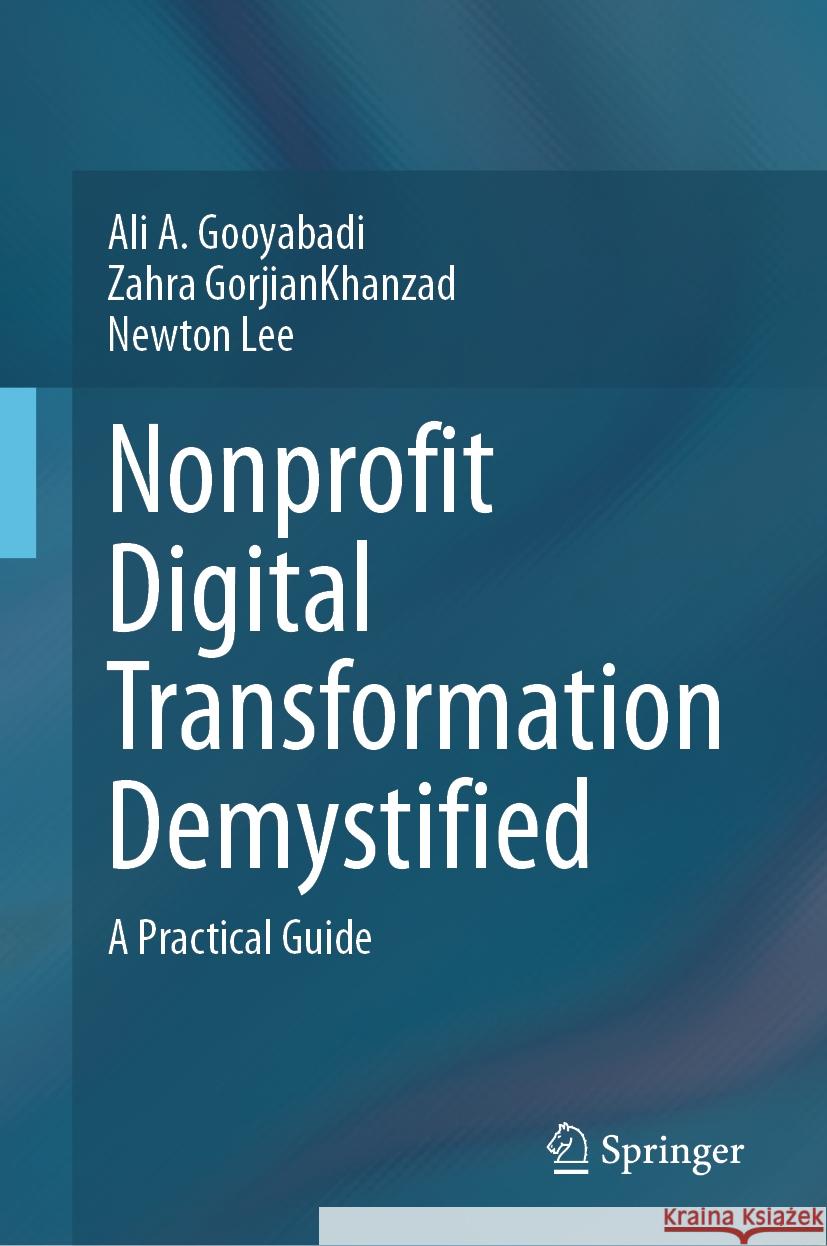Nonprofit Digital Transformation Demystified: A Practical Guide » książka



Nonprofit Digital Transformation Demystified: A Practical Guide
ISBN-13: 9783031471810 / Angielski
Nonprofit Digital Transformation Demystified: A Practical Guide
ISBN-13: 9783031471810 / Angielski
(netto: 575,06 VAT: 5%)
Najniższa cena z 30 dni: 539,74
ok. 16-18 dni roboczych.
Darmowa dostawa!
Preface.- Chapter One: Introduction.- Part I: Setting The Stage For Digital Transformation In NPOs.- Chapter Two: Digital Transformation: The New Frontier For NPOs.- Chapter Three: Nonprofit Digital Transformation: Choice Or Mandate?.- Part II: Nonprofit’s Inherent Nature In Digital Transformation.- Chapter Four: Nonprofits Vs. For-Profits Digitalization.- Chapter Five: A Qualitative Study.- Chapter Six: A Structured Approach To Digital Transformation In Nonprofits.- Part III: Mapping Out Nonprofit Digital Transformation.- Chapter Seven: Digital Maturity Models.- Chapter Eight: Nonprofit Digital Maturity Model (NDMM).- Chapter Nine: Anchoring Digital Transformation: The Triad Of Culture, Ethics, And Security.- Chapter Ten: The Ai Revolution In Nonprofits: A New Paradigm.-
Ali Gooyabadi, Ph.D. An esteemed IEEE senior member holding a Ph.D. in Control Engineering from the University of Colorado at Boulder, he stands distinguished with a 30-year trajectory as a university professor, National Advisor, and IT entrepreneur. Orchestrating global IT megaprojects and being deeply engaged with NGOs, he has carved a niche in engineering, high-tech ventures, and advanced academia. His innovation has driven remarkable breakthroughs in automation, control, and national IT blueprints, further steering pivotal organizational shifts. Educating across three continents, he has seamlessly melded theory and practice, offering over 100 courses that bridge business and technology in both esteemed academic settings and top-tier executive training forums.
Zahra GorjianKhanzad, D.B.A., A strategic manager with deep academic roots, Dr. Gorjian embodies the spirit of strategic foresight and adaptability. Boasting 18 prolific years spanning diverse roles, from systems analysis to project leadership in different industries, including education, her journey in the high-tech sector has sharpened her innate strategic management acumen. Passionate about driving digital transformation, especially in SMEs and Nonprofits. A proud member of the San Diego Diplomacy Council's DEI committee and Associate member of the International Society for Development and Sustainability (ISDS), her prowess goes beyond management and academics into a passion for advancing Nonprofits. Her doctorate dissertation is the underpinning research for this book.
Newton Lee, DCS Professor Newton Lee stands as a beacon of innovation and community-driven purpose. His role at The Walt Disney Company highlighted not just his software engineering expertise, but also his dedication to community service through the Disney VoluntEARS Leadership Council. However, Professor Lee's vision expanded beyond the corporate world with the establishment of the Institute for Education, Research, and Scholarships (IFERS), a tech-integrated nonprofit backed initially by figures like Quincy Jones. Today, IFERS, riding on the wave of digital transformation, supports over 150 global nonprofit initiatives. Professor Lee's academic laurels from Virginia Tech and Vincennes University underscore his tech acumen, further cemented by a string of accolades, including a Michigan Leading Edge Technologies Award and four Disney VoluntEARS Leadership Awards from The Walt Disney Company. In essence, Professor Lee masterfully melds technology and service, crafting a legacy of impactful global change.In this compelling journey into Digital Transformation (DT) tailored for Nonprofit Organizations (NPOs), this book unravels the intricacies of technological integration. Grounded in over one hundred years of extensive research by authors and the editor, real-world examples, and using the San Diego Diplomacy Council (SDDC) as a primary case study, it introduces a tailored Digital Maturity Model (DMM) for NPOs. At the heart of this transformation are three pivotal pillars: Culture, Ethics, and Security.
Part I sets the stage, painting a landscape of how NPOs have intertwined with the digital realm. As technology's omnipresence surges, Chapter Two offers a panorama of DT's historical and contemporary intersections with the nonprofit sector. The subsequent chapter emphasizes the stark reality: for many NPOs, digital adaptation is no longer about relevance but survival.
Part II delves into the comparative digital strategies of NPOs and their for-profit counterparts in Chapter 4, highlighting the need for tailored approaches. Chapter 5 explores the Nonprofit Digital Maturity Model (NDMM), using the San Diego Diplomacy Council as a focal point. The journey then unfolds further in Chapter 6, which casts a spotlight on the strategic execution of DT in NPOs, weaving in comprehensive analyses to dissect the forces shaping an NPO's digital trajectory.
Part III dives deeper, with Chapter 7 laying the foundation of the NDMM. The subsequent chapter meticulously unpacks the NDMM, culminating in Chapter 9, which emphasizes the pillars of DT—Culture, Ethics, and Security—forming the essence of the Nonprofit DT Strategic Framework (NDTSF). This chapter also crafts a tailored roadmap for NPOs, charting a comprehensive DT course.
Concluding with a forward-looking stance, Chapter 10 thrusts readers into the enthralling fusion of AI and NPOs, exploring transformative potentials and ethical concerns. Through real-world cases, it positions AI as both a potent tool and a vital dialogue for NPOs.
Essentially, this book equips NPOs with tools like the NDMM and insights from successful DT narratives. It seeks to provide a practical guide for nonprofits through their DT journey, ensuring they harness technology ethically and effectively without compromising their core values.1997-2026 DolnySlask.com Agencja Internetowa
KrainaKsiazek.PL - Księgarnia Internetowa









